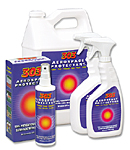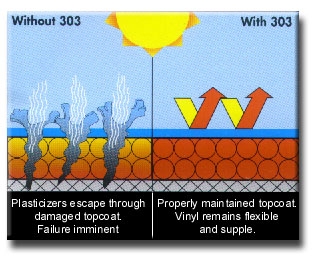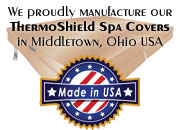 Sonshine Products recommends that our ThermoShield premium spa covers be protected with 303 Aerospace Protectant. We stock both the 8 oz. and 16 oz. sizes for you to carry in your store.
Sonshine Products recommends that our ThermoShield premium spa covers be protected with 303 Aerospace Protectant. We stock both the 8 oz. and 16 oz. sizes for you to carry in your store.
A vinyl cover needs to be cleaned and cared for in order to gain the full life value of the vinyl. Many claims have been made other cleaning product, but this one really works.
An ultraviolet (UV) screening treatment should be applied to the vinyl to protect it from the effects of sunlight. Most UV screening products contain silicone oils which leave the vinyl surface very greasy and cause them to attract dirt. They also contain petrochemicals which may give the vinyl a shine, but will dry out the material and cause it to blister and crack.
In twenty years, we have found no product other than 303 Protectant that we feel confident in recommending to our covers´ consumers.
 An enlarged sideview of common vinyl fabric would show raw PVC (polyvinyl chloride) covered by a thin layer of plastic called the "topcoat". The topcoat is the part of the vinyl that you can see and touch. To keep vinyl fabric soft and flexible, manufacturers add agents known as plasticizers to the raw PVC. A major function of the topcoat is to hold in these plasticizers, which otherwise would quickly evaporate. If the topcoat is damaged or degraded, plasticizers begin to escape leading to embrittlement, cracking, and failure.
An enlarged sideview of common vinyl fabric would show raw PVC (polyvinyl chloride) covered by a thin layer of plastic called the "topcoat". The topcoat is the part of the vinyl that you can see and touch. To keep vinyl fabric soft and flexible, manufacturers add agents known as plasticizers to the raw PVC. A major function of the topcoat is to hold in these plasticizers, which otherwise would quickly evaporate. If the topcoat is damaged or degraded, plasticizers begin to escape leading to embrittlement, cracking, and failure.
Protecting the topcoat, then, is the most crucial aspect of properly maintaining vinyl and the subject with which vinyl manufacturers are most concerned. Vinyl manufacturers agree on and recommend the following.
General Cleaning: Never use household cleaners, powdered or other abrasives, steelwool or industrial cleaners, dry cleaning fluids, solvents (petroleum distillates), bleach or detergents. Use a medium-soft brush, warm soapy water (such as Ivory soap), rinse with cool water and then dry. Mildew stains: To kill the bacteria creating the mildew, use a medium-soft brush and vigorously brush the stained area with a 4 to 1 mixture of water and ammonia; rinse with cool water. Tough mildew stains: Apply a mixture of one (1) teaspoon ammonia, one-fourth (1/4) cup of hydrogen peroxide and three-fourths (3/4) cup of distilled water; rinse with cool water. Note: All cleaning must be followed by a thorough rinse with water.
Obviously, abrasives should never be used on vinyl. Petroleum distillates are a universal "no no" for vinyl. Waxes should never be used on vinyl because (a) Most waxes contain petroleum distillates; (b) Wax is a build-up product, holding in the heat absorbed from the sun and accelerating heat damage.
Virtually all vinyl manufacturers agree that no type of oil should be used on vinyl. Silicone oil vinyl treatments should not be used for several reasons: 1) Silicone oil formulations typically attack the topcoat. 2) Silicone oil formulations usually contain no effective UV screening ingredients. 3) Silicone oil formulations are build-up products which accelerate heat damage. 4) Silicone oil formulations are greasy and oily, attract dirt, and soil more quickly. READ THE LABEL! Product directions suggesting more than one coat for better cosmetic enhancement are build-up products and are recommended against by vinyl manufacturers.
303 Protectant is a beautifying liquid sunscreen, the routine use of which keeps vinyl looking like new while dramatically extending its useful life. 303 contains no petrochemicals, silicone oils, or petroleum distillates. 303 is not a build-up product. 303 treated surfaces dissipate heat normally.
303 is not oily or greasy and does not attract dust. In fact, 303 treated vinyl repels dust, dirt, and stains, stays cleaner longer and is much easier to clean when finally soiled. 303 has been tested and is recommended by major vinyl and vinyl accessory manufacturers (including Sonshine Products). As the leader in UV screening technology since 1980, 303 is the most powerful UV screening treatment available for vinyl. Regular use of 303 can reduce UV caused slow-fade up to 100%
